- Last Updated: February 16th, 2026
Key Takeaways
Ozempic lawsuits involve claims of serious gastrointestinal injuries and high costs, with plaintiffs seeking compensation for medical bills, pain and suffering, and lost wages.
Patients affected by Ozempic can seek economic damages for medical expenses, lost wages, and future costs, as well as non-economic damages for physical pain, emotional distress, and loss of enjoyment of life. Understanding the statute of limitations and potential exceptions is crucial for filing timely Ozempic injury claims.
Choosing the right Ozempic legal representation involves considering factors such as the attorney's experience, reputation, and fee structure. Joining an Ozempic class action lawsuit can be cost-efficient and simplify the process while pursuing an individual claim allows for more control and potentially higher compensation.
Overview of Ozempic Legal Help and Lawsuits
On this page, we’ll discuss an overview of Ozempic legal help, potential side effects and risks associated with Ozempic, legal grounds for pursuing an Ozempic Lawsuit, and much more.
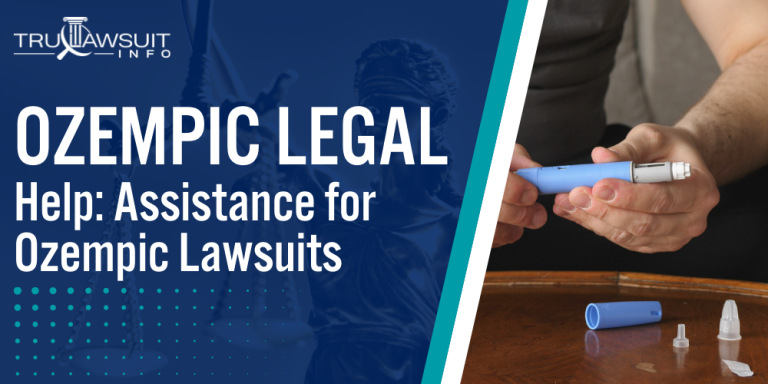
Introduction to Ozempic Legal Help
Key concerns in these lawsuits include:
- Alleged Side Effects: Claims that Ozempic causes serious gastrointestinal issues.
- Cost Implications: High prices of the drug lead to financial strain for patients.
- Patent Disputes: Legal battles over the patents and generic versions of the drug.
If you or a loved one has suffered from serious side effects or health complications after taking Ozempic, you may be entitled to compensation.
Contact TruLawsuit Info using the chat on this page to receive an instant case evaluation and determine whether you qualify to file an Ozempic lawsuit.
Potential Side Effects and Risks Associated with Ozempic
Ozempic, used for managing type 2 diabetes, has become the subject of numerous lawsuits.
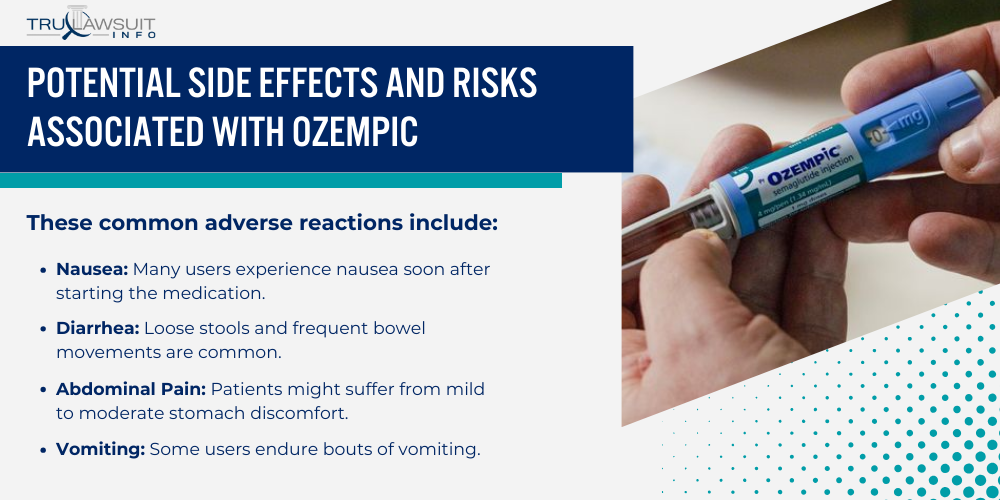
These cases often involve claims of gastrointestinal injuries linked to the drug.
The MDL Panel noted that several lawsuits contain similar allegations against Ozempic and related medications.
Ozempic, a medication commonly prescribed for type 2 diabetes and sometimes used for weight loss, comes with a range of side effects and potential health risks.
Common Adverse Reactions Reported by Ozempic Users
Patients taking Ozempic often report certain side effects.
These common adverse reactions include:
- Nausea: Many users experience nausea soon after starting the medication.
- Diarrhea: Loose stools and frequent bowel movements are common.
- Abdominal Pain: Patients might suffer from mild to moderate stomach discomfort.
- Vomiting: Some users endure bouts of vomiting.
- Constipation: Ozempic may also lead to constipation in some patients.
Add bold styling to keywords, related keywords, and lead-in sentences:
Patients may experience these side effects during the first few weeks of treatment as their bodies adjust to the medication.
Serious Health Complications Linked to Ozempic Use
More severe health concerns have been associated with Ozempic.
These serious health conditions include:
- Gallbladder Injury: There have been reports of gallbladder issues, including gallstones.
- Pancreatitis: Inflammation of the pancreas is a serious risk linked to this drug.
- Kidney Problems: Some users report reduced kidney function and even kidney failure.
- Increased Risk of Thyroid Tumors: Animal studies suggest a correlation with thyroid tumors, posing a risk for humans.
- Chronic Stomach Pain: Some patients suffer from chronic and severe abdominal pain, possibly leading to conditions like stomach paralysis.
Ozempic can also cause deep vein thrombosis and precipitate a mental health crisis in some individuals, increasing the urgency for careful monitoring by healthcare professionals.
Monitoring these adverse effects is essential for ensuring patient safety.
For more information on potential serious health issues related to Ozempic, visit the FDA’s update on counterfeit Ozempic.
Eligibility Criteria for Filing an Ozempic Lawsuit
Ozempic is a diabetes medication facing legal challenges due to its alleged side effects and high costs.
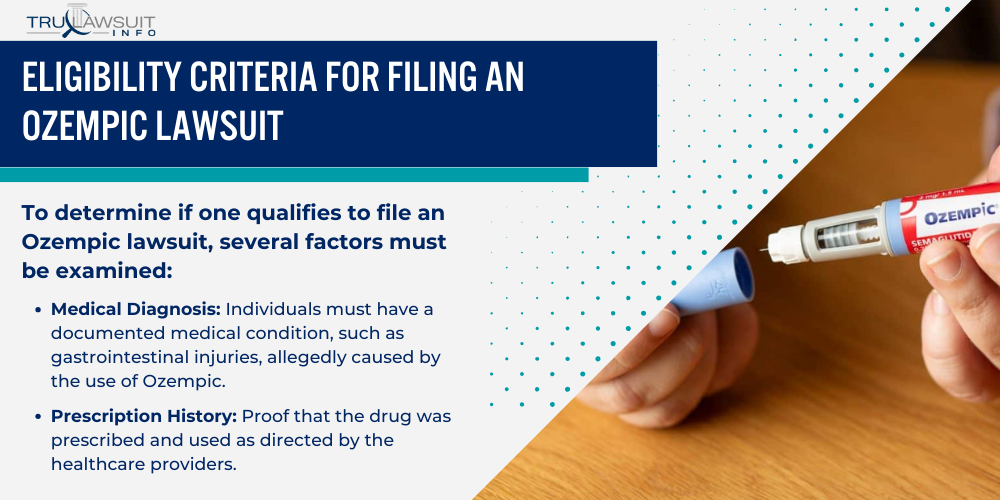
Understanding the legal landscape around this drug is essential for those affected.
Filing an Ozempic lawsuit requires meeting specific criteria, which include determining your eligibility and gathering the necessary evidence to support your claim.
These steps are essential to ensure your case is valid and actionable.
Determining If You Qualify for Ozempic Legal Help
Determining if you qualify for legal help with Ozempic-related issues can be crucial for your case.
Gathering comprehensive information to support your claim and demonstrate the link between your condition and the medication is important.
To determine if one qualifies to file an Ozempic lawsuit, several factors must be examined:
- Medical Diagnosis: Individuals must have a documented medical condition, such as gastrointestinal injuries, allegedly caused by the use of Ozempic.
- Prescription History: Proof that the drug was prescribed and used as directed by the healthcare providers.
- Timeline of Events: A clear timeline showing when the drug was used and when the adverse effects appeared.
- Medical Expenses: Document medical expenses incurred due to complications from using Ozempic.
- Extent of Damages: Assessment of the impact on the individual’s health, work-life, and personal life, including lost wages and other related costs.
Gathering Evidence to Support Your Ozempic Claim
Gathering strong evidence is essential for substantiating your Ozempic claim.
Properly documented evidence can significantly improve your chances of a successful outcome.
Supporting an Ozempic claim necessitates a thorough collection of evidence:
- Medical Records: Collect all medical records, including diagnosis, treatments received, and any ongoing medical condition linked to Ozempic.
- Prescription Documentation: Obtain copies of prescriptions and pharmacy records showing diabetes drug ozempic usage.
- Personal Statements: Document personal statements detailing the experienced side effects and their impact.
- Expert Testimonies: Seek expert testimonies from healthcare professionals to establish a direct link between Ozempic and the injuries.
- Financial Records: Maintain records that detail medical expenses, lost wages, and any other financial impacts related to the injuries.
Gathering evidence effectively enhances the strength of your case.
This approach ensures all necessary documentation is comprehensive and supports your claim.
Working with experienced Ozempic lawyers can aid in organizing and presenting this evidence accurately.
Legal Grounds for Pursuing an Ozempic Lawsuit
Legal grounds for filing an Ozempic lawsuit often involve proving that the drug caused specific injuries and that the manufacturer failed to adequately warn patients.
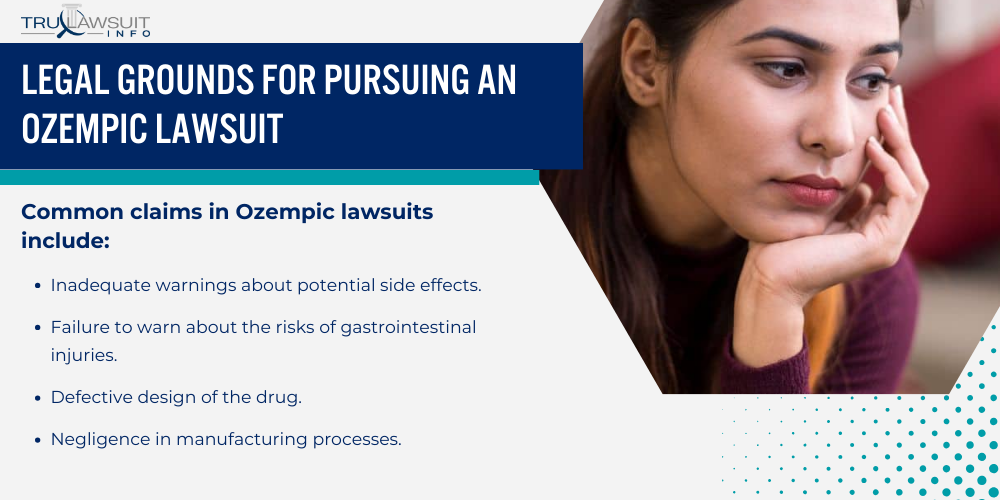
Key aspects include understanding lawsuits, proving negligence, and establishing the link between Ozempic and injuries.
Understanding Ozempic Lawsuits and Claims
Ozempic lawsuits typically involve claims that users experienced adverse effects due to the drug.
Individuals may seek compensation for medical bills, pain and suffering, and lost wages.
Common claims in Ozempic lawsuits include:
- Inadequate warnings about potential side effects.
- Failure to warn about the risks of gastrointestinal injuries.
- Defective design of the drug.
- Negligence in manufacturing processes.
Proving Negligence or Wrongdoing by the Manufacturer
To succeed in an Ozempic lawsuit, plaintiffs must prove that the manufacturer, such as Novo Nordisk or Eli Lilly, acted negligently.
This involves showing that the company knew or should have known about the risks but did not take appropriate action.
Important factors in proving negligence:
- Evidence that the manufacturer was aware of the risks.
- Records of any internal studies indicating potential harm.
- Previous incidents or complaints filed against the drug.
- Marketing practices that downplay risks.
Establishing Causation Between Ozempic and Injuries
Establishing a direct link between Ozempic and injuries is critical.
Plaintiffs need to demonstrate that their injuries were specifically caused by using Ozempic and not by other factors.
Steps to establish causation:
- Medical records showing the use of Ozempic.
- Expert testimony to link the drug to the injury.
- Clinical studies supporting the claims of side effects.
- Documentation of the timeline of drug usage and onset of symptoms.
By focusing on these key areas, individuals can build a strong case against pharmaceutical companies and seek justice for the harm caused by Ozempic.
Types of Compensation in Ozempic Legal Cases
Patients who have experienced adverse effects from Ozempic might be entitled to various types of compensation.
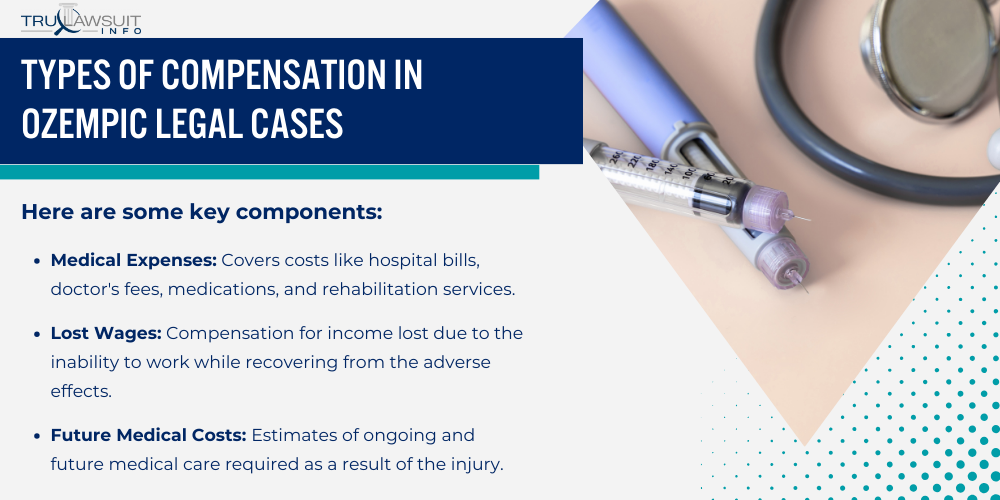
These compensations often cover both financial losses and non-monetary damages like pain and suffering.
Economic Damages Recoverable in Ozempic Lawsuits
Economic damages typically address the financial impact of an injury or illness caused by Ozempic.
Here are some key components:
- Medical Expenses: Covers costs like hospital bills, doctor’s fees, medications, and rehabilitation services.
- Lost Wages: Compensation for income lost due to the inability to work while recovering from the adverse effects.
- Future Medical Costs: Estimates of ongoing and future medical care required as a result of the injury.
- Out-of-Pocket Expenses: Includes transportation to medical appointments and other necessary expenditures directly related to the injury.
- Loss of Earning Capacity: Compensates for the reduced ability to earn income in the future due to long-term effects.
Patients should maintain detailed records and receipts to help substantiate these claims in court.
Non-Economic Damages for Pain and Suffering
Non-economic damages are intended to compensate for the more intangible losses associated with Ozempic-related harm.
These typically include:
- Physical Pain: Compensation for the bodily pain experienced due to adverse reactions or complications from Ozempic.
- Emotional Distress: Covers the mental anguish, anxiety, and emotional trauma resulting from the health issues.
- Loss of Enjoyment of Life: For the inability to participate in hobbies, daily activities, or passions that were possible before the injury.
- Mental Health Crisis: Damages for costs related to therapy or other mental health treatments needed due to the psychological impact of the injury.
Non-economic damages are often subjective and may vary significantly between cases.
Clear, consistent documentation from medical and mental health professionals can support these claims.
Statute of Limitations for Filing Ozempic Claims
The statute of limitations for filing Ozempic claims involves specific timeframes and possible exceptions that plaintiffs should be aware of.
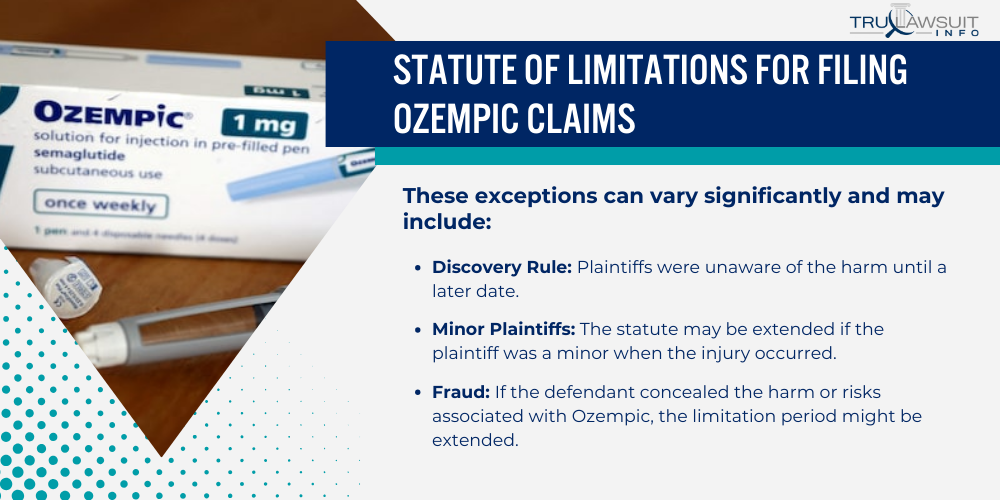
This period is critical for the legal process and impacts one’s ability to seek compensation.
Exceptions to the Statute of Limitations Rule
Certain exceptions may allow plaintiffs to file claims even after the standard statute of limitations has expired.
These exceptions can vary significantly and may include:
- Discovery Rule: Plaintiffs were unaware of the harm until a later date.
- Minor Plaintiffs: The statute may be extended if the plaintiff was a minor when the injury occurred.
- Fraud: If the defendant concealed the harm or risks associated with Ozempic, the limitation period might be extended.
- Mental Incompetence: If the plaintiff was not mentally competent at the time of the injury, extensions may be granted.
Each of these exceptions can be complex and require thorough legal examination to determine if they apply.
Seeking legal help promptly can ensure all potential avenues for claims are explored and timelines are properly adhered to.
Choosing the Right Ozempic Legal Representation
When seeking legal representation for an Ozempic-related issue, consider factors such as the attorney’s experience and the structure of their fees.
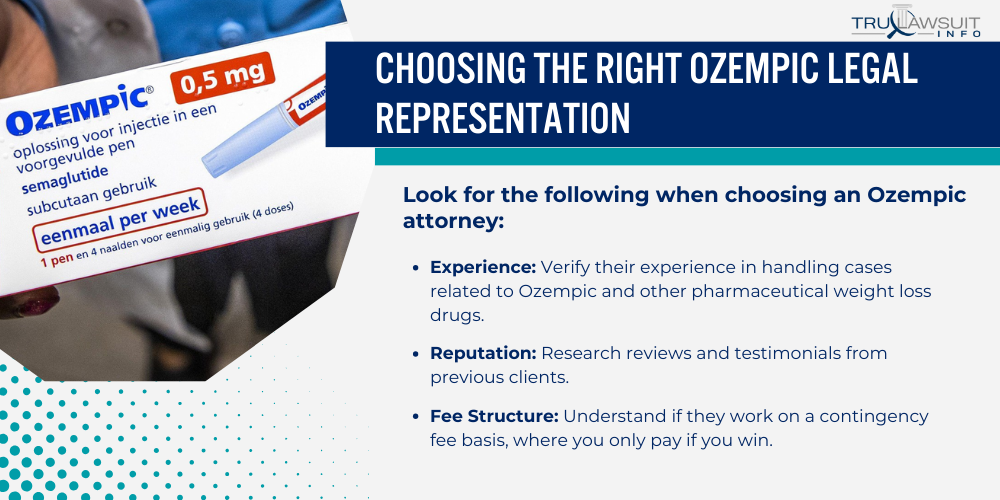
Key questions during initial consultations can help evaluate the suitability of the legal counsel.
Factors to Consider When Selecting an Ozempic Attorney
Choosing an Ozempic attorney requires assessing several important factors.
An experienced Ozempic lawyer should have a strong track record in handling similar cases.
It’s essential to confirm their expertise in pharmaceutical litigation and their familiarity with Ozempic-specific legal challenges.
Look for the following when choosing an Ozempic attorney:
- Experience: Verify their experience in handling cases related to Ozempic and other pharmaceutical weight loss drugs.
- Reputation: Research reviews and testimonials from previous clients.
- Fee Structure: Understand if they work on a contingency fee basis, where you only pay if you win.
- Success Rate: Ask about their success rate in similar lawsuits to gauge their ability to secure favorable outcomes.
Questions to Ask During an Ozempic Legal Consultation
A consultation allows you to ask critical questions to evaluate the fit of the Ozempic lawsuit lawyer for your case.
Here are some key questions to consider:
- Case Handling: Who will handle my case and how will they keep me updated?
- Fee Agreement: Can you explain your fee structure and what percentage you take in a contingency fee agreement?
- Previous Cases: Can you share results of your previous Ozempic or pharmaceutical litigation cases?
- Timeline: What is the expected timeline for such cases and what are potential hurdles?
- Next Steps: What are the immediate next steps if I choose to hire you?
These questions aim to provide clarity and ensure that you are making a well-informed decision about your legal representation.
The Ozempic Lawsuit Process: What to Expect
The Ozempic lawsuit process involves a series of legal steps and timeframes that plaintiffs should be aware of when seeking compensation for alleged injuries.

It is important to understand the procedures and estimated timelines involved.
Steps Involved in Filing an Ozempic Lawsuit
Filing an Ozempic lawsuit requires careful preparation and understanding of the legal process.
The steps ensure that plaintiffs can build a strong case and seek justice for any harm caused by the medication.
Filing an Ozempic lawsuit involves several key steps that plaintiffs should be prepared for:
- Consultation with a Legal Professional: The process begins with consulting a lawyer specializing in pharmaceutical litigation. This step assesses the viability of the case.
- Filing the Complaint: The Ozempic lawsuit details allegations against the drug manufacturer.
- Service of Process: The defendant is formally notified through legally required means.
- DiscoveryPhase: Both parties exchange evidence and information. This can include medical records, expert testimonies, and more.
- Pretrial Motions: Legal motions, such as motions to dismiss the case, may be filed to resolve certain issues before trial.
Each step in this process is crucial to building a strong legal case against the manufacturers of Ozempic.
Estimated Timeline for Ozempic Legal Proceedings
Due to the nature of the case and the number of parties involved, the Ozempic legal proceedings are expected to be lengthy.
Understanding each phase of the process helps in setting realistic expectations for plaintiffs.
The timeline for Ozempic legal proceedings can vary but typically follows a structured path:
- Case Evaluation: Initial legal consultation and case assessment can take a few weeks to a couple of months.
- Filing to Response: Once the lawsuit is filed, the defendant usually has 30 to 60 days to respond.
- Discovery Phase: This phase can be lengthy, often taking several months to a year, depending on the complexity of the evidence.
- Pretrial Motions and Hearings: This step can add another few months to the process as both sides prepare for trial.
- Trial: If the case goes to trial, it could last days to weeks, depending on the specifics of the case.
Factors such as multidistrict litigation and judicial interventions might affect the timeline.
The involvement of a federal judge or a district judge like Gene can also influence the pace of proceedings.
For continuous updates, plaintiffs should keep an eye on Ozempic lawsuit updates.
Ozempic Class Action Lawsuits vs.Individual Claims
Understanding the key differences between class action lawsuits and individual claims can help those affected by Ozempic make informed decisions.
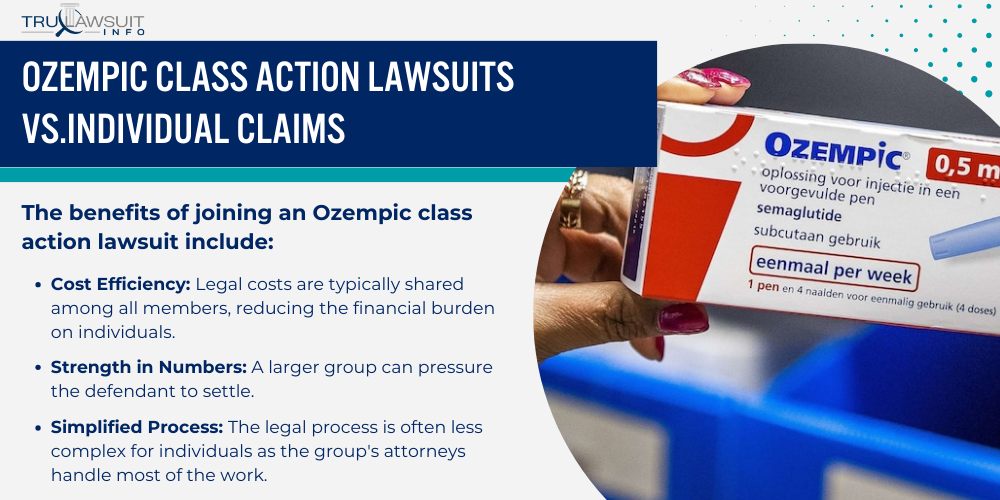
Each legal path has specific benefits and drawbacks depending on the individual’s circumstances.
Benefits and Drawbacks of Joining an Ozempic Class Action
Joining a class action lawsuit can be a significant decision with benefits and drawbacks.
While it offers potential advantages, it’s important to weigh them against the possible downsides to determine if it’s the right choice for you.
The benefits of joining an Ozempic class action lawsuit include:
- Cost Efficiency: Legal costs are typically shared among all members, reducing the financial burden on individuals.
- Strength in Numbers: A larger group can pressure the defendant to settle.
- Simplified Process: The legal process is often less complex for individuals as the group’s attorneys handle most of the work.
- Consistent Outcomes: Members receive similar outcomes, avoiding vastly different compensations for similar claims.
The drawbacks of joining an Ozempic class action lawsuit include:
- Less Control: Individuals have minimal say in decision-making, such as settlements.
- Lower Payouts: Compensation might be less compared to what might be obtained in an individual claim.
- Shared Compensation: The awarded compensation is divided among all class members.
- Time-Consuming: Class actions can take a long time to settle, delaying compensation.
When to Pursue an Individual Ozempic Legal Case
Opting for an individual legal case may benefit those with specific circumstances or who prefer more control over their legal proceedings.
This approach can provide a more personalized legal strategy and potentially greater compensation.
Consider individual claims when:
- Severity of Harm: The individual has suffered severe or unique damages from Ozempic.
- Control Over the Case: The person prefers to make decisions about settlements and legal strategies.
- Potential for Higher Compensation: Individual cases might result in higher payouts due to tailored compensation for specific damages.
- Faster Resolution: Individual cases can sometimes be resolved more quickly than class actions.
In such cases:
- Consulting with specialized Ozempic attorneys who focus on personal injury and pharmaceutical litigation can offer tailored advice.
- Gathering thorough medical documentation and evidence to support the claim enhances the case’s strength.
- It’s important to weigh the potential costs, as individual claims may require more upfront expenses for legal representation and court fees.
Opting for an individual claim allows for a more customized legal approach, ensuring that compensation aligns closely with the personal impact experienced.
TruLaw: The #1 Law Firm for a Lawsuit Against Ozempic
TruLaw specializes in offering expert legal assistance for individuals impacted by Ozempic.
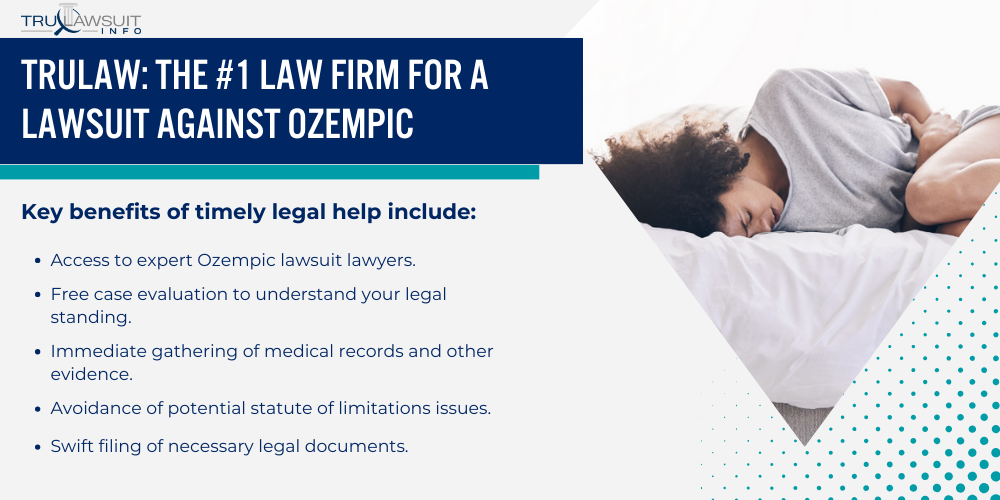
Their professional team ensures that you receive the necessary support and guidance through each step of the legal process.
Importance of Seeking Timely Ozempic Legal Help
Timeliness is critical when it comes to addressing potential issues with Ozempic.
Early intervention can affect the outcome of your case and ensure that essential evidence is preserved.
Key benefits of timely legal help include:
- Access to expert Ozempic lawsuit lawyers.
- Free case evaluation to understand your legal standing.
- Immediate gathering of medical records and other evidence.
- Avoidance of potential statute of limitations issues.
- Swift filing of necessary legal documents.
- Quick resolution of claims, reducing stress and uncertainty.
Patients seeking legal help with Ozempic-related issues need to understand these aspects, as well as the potential for centralized litigation.
Legal experts can provide guidance on pursuing compensation for injuries and financial losses.
This activity is part of a broader effort to manage and resolve similar claims efficiently.
Frequently Asked Questions
-
The key concerns in Ozempic lawsuits include alleged side effects such as serious gastrointestinal issues, high prices of the drug leading to financial strain for patients, and legal battles over patents and generic versions.
These lawsuits often involve claims of gastrointestinal injuries linked to the drug.
-
Patients taking Ozempic often report certain side effects, including nausea, diarrhea, abdominal pain, vomiting, and constipation.
These common adverse reactions may occur during the first few weeks of treatment as the patient’s body adjusts to the medication.
-
To determine if one qualifies to file an Ozempic lawsuit, several factors must be examined, such as having a documented medical condition allegedly caused by the use of Ozempic, proof of prescription and usage as directed, a clear timeline of events, documentation of medical expenses incurred, and assessment of the impact on the individual’s health and life.
-
Patients who have experienced adverse effects from Ozempic might be entitled to various types of compensation, covering both financial losses and non-monetary damages.
Economic damages typically address the financial impact, such as medical expenses, lost wages, future medical costs, out-of-pocket expenses, and loss of earning capacity, while non-economic damages compensate for intangible losses like physical pain, emotional distress, loss of enjoyment of life, and mental health crisis.
-
The benefits of joining an Ozempic class action lawsuit include cost efficiency, strength in numbers, simplified process, and consistent outcomes.
However, the drawbacks include less control over the case, potentially lower payouts, shared compensation among all class members, and a time-consuming process.

Attorney Jessie Paluch, founder of TruLawsuit Info, has over 25 years of experience as a personal injury and mass tort attorney, and previously worked as an international tax attorney at Deloitte. Jessie collaborates with attorneys nationwide — enabling her to share reliable, up-to-date legal information with our readers.
Legally Reviewed
This article has been written and reviewed for legal accuracy and clarity by the team of writers and legal experts at TruLawsuit Info and is as accurate as possible. This content should not be taken as legal advice from an attorney. If you would like to learn more about our owner and experienced injury lawyer, Jessie Paluch, you can do so here.
Fact-Checked
TruLawsuit Info does everything possible to make sure the information in this article is up to date and accurate. If you need specific legal advice about your case, contact our team by using the chat on the bottom of this page. This article should not be taken as advice from an attorney.
You can learn more about the Ozempic Lawsuit by visiting any of our pages listed below:
Here, at Tru Lawsuit Info, we’re committed to helping victims get the justice they deserve.
To do this, we actively work to connect them with attorneys who are experts in litigating cases similar to theirs.
Table of Contents
Tru Lawsuit Info is a reliable source of information about issues that may affect your health and safety, such as faulty products, data breaches, and environmental hazards.
Our team of experienced writers collaborates with medical professionals, lawyers, and advocates to produce informative articles, guides, and other resources that raise awareness of these topics.
Our thorough research provides consumers with access to reliable information and updates on lawsuits happening around the country. We also can connect consumers with attorneys if they need assistance.
Here, at Tru Lawsuit Info, we’re committed to helping victims get the justice they deserve.
To do this, we actively work to connect them with attorneys who are experts in litigating cases similar to theirs.
